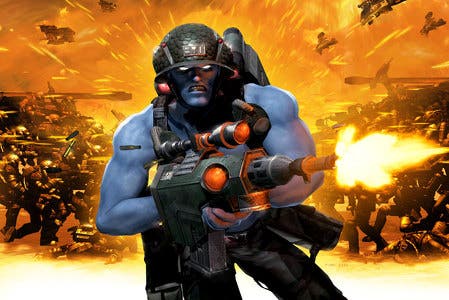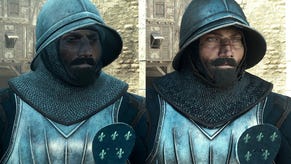Retrospective: Rogue Trooper
Mo' better blues.
What does Master Chief look like under his armour? It's a question that has spawned thousands of fan-art uploads, many of them eye-wateringly pornographic, but for me the answer was always obvious. He's got blue skin, white eyes and a natty mohawk. How do I know this? Because he's a genetically engineered super soldier designed to survive in hostile alien conditions. He's Rogue Trooper.
In 2006, five years after Master Chief stomped onto the Xbox, 2000AD's Genetic Infantryman finally got to strut his stuff in the modern console era. Rebellion's sturdy and deeply satisfying third-person shooter may have followed Halo but it still pioneered many of the features that would become ubiquitous thanks to that other iconic Xbox franchise, Gears of War.
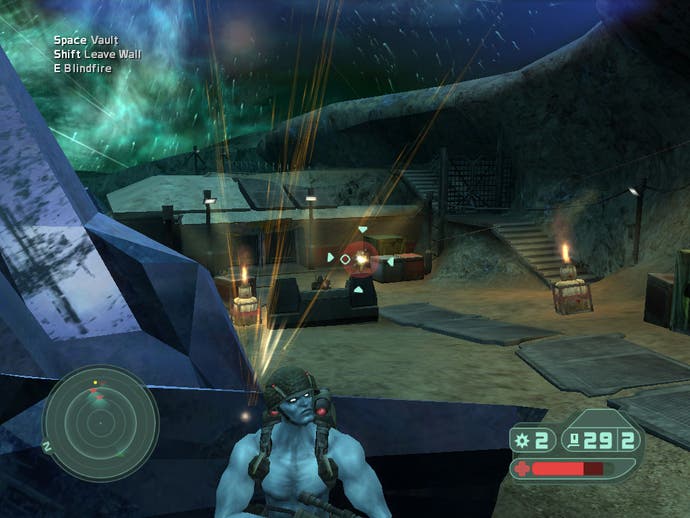
Consider Rogue's back-story and it's obvious why this was his third video game outing, following an ambitious isometric 8-bit computer game and a lacklustre side-scroller for the Amiga and Atari ST. Quite simply, even though he was created in 1981, long before gaming had become the powerhouse medium it is today, Rogue Trooper could have been designed for joypad glory.
His story, for one, has a clarity and episodic drive that makes it perfect for interactive adaptation. Our blue-skinned hero is one of many Genetic Infantrymen built to withstand the toxic battlegrounds of Nu Earth, where a civil war rages between the fascistic Norts and their underdog enemies, the Southers. These blue-skinned warriors are dropped into the Quartz Zone where they're promptly massacred, betrayed by a traitorous Souther general. Only one GI survives, and he sets off to deliver some retribution to the man who betrayed his kin, for which he's branded a deserter. Caught between the two armies, trusted by no-one, he earns the nickname Rogue Trooper.
It's a scenario that could have been ripped from the plot of dozens of games released since, and the execution is also very familiar from our 2012 vantage point. Back in 2006, however, the idea of cover-based shooting was still the preserve of cult efforts like Kill Switch. The crouch-and-cover template adds a realistic military feel to Rogue Trooper's otherwise fanciful wartime allegory, and as you pick your way carefully across large open battlefields or through tangled ruins, you really feel like a trooper rather than a superhero. The GIs may be tough, but they're not invincible.
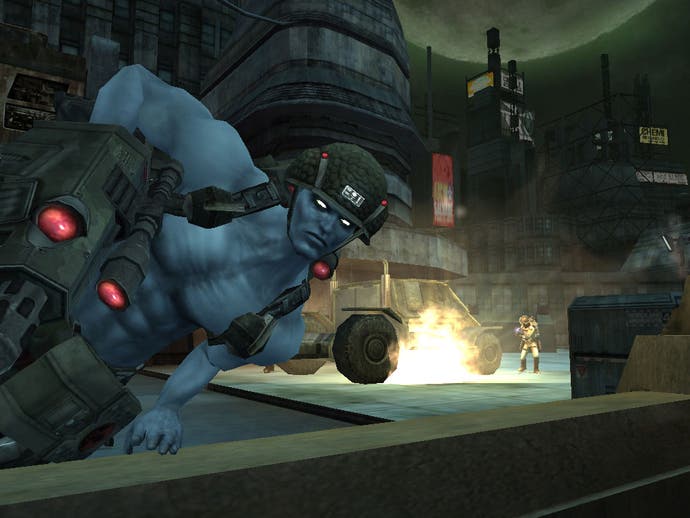
This point is illustrated by the game's squad mechanic. Rogue Trooper, rather uniquely, gets to enjoy all the dynamics of a squad-based game without the attendant AI problems and drop-in player agency of having multiple characters running around. True to the comic strip, all three of Rogue's dead comrades are carried with him as sentient biochips attached to his gear. It's the sort of brilliant idea that some game would surely have come up with sooner or later, but it was handed to Rebellion on a plate by the prodigious imagination of comic writer Gerry Finley-Day.
Each character, rather conveniently named after the item of kit they end up attached to, performs a useful gameplay function and the first few levels of the game are based around retrieving their biochips and getting yourself tooled up.
Bagman looks after supplies, using robot arms that pop out of Rogue's backpack to automatically offer fresh ammo when you run dry, as well as administering medpacks for injuries too severe for your automatic healing to cope with. Gunnar inhabits your rifle, and while there are other weapons in the game - a shotgun, a mortar, a beam weapon - it's his assisted aiming and bloodthirsty banter that gets you through the tougher encounters. Finally, there's Helm, sat up there on your head providing you with a radar, holographic decoy, sentry gun and other gizmos. He's also your hacker, which means opening doors can mean defending yourself without his useful abilities while he goes about his business.
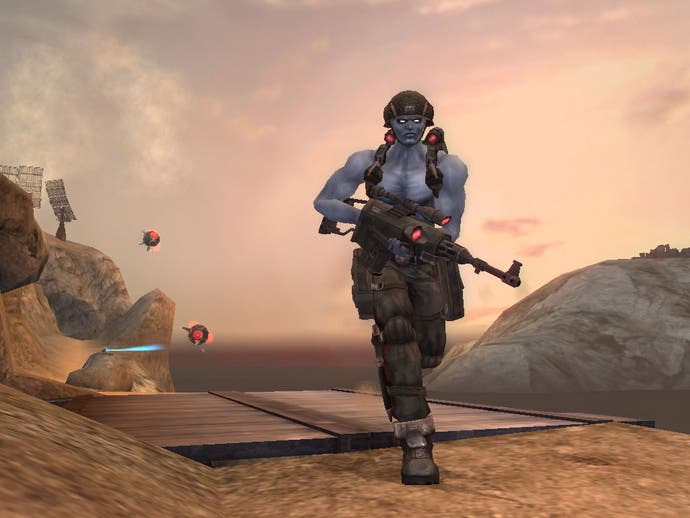
It's a fine spread of features, seamlessly executed in a way that enhances both gameplay and story while ensuring the player is always the one in control, leading the way. Not for Rogue Trooper the demoralising job of trudging along behind AI partners, watching them take down enemies. Yet nor does he face his epic quest alone, as his companions provide a constant back-and-forth bickering soundtrack that adds personality to the otherwise chunky brown landscapes.
Most notably, Rogue Trooper stands out as a game based on an existing source that succeeded without diminishing either. Rebellion owns the 2000AD comic brand, buying the comic and all its assets rather appropriately in June 2000, and there's a care and attention to the details in Rogue Trooper that speaks highly of the studio's regard for the characters. Rather than hammering them into a generic gaming template, it instead matched the key points of the series up to existing and reliable gameplay ideas, resulting in a game that is both true to the comic strip and sturdy enough to stand on its own.
That's why it's rather disappointing that Rebellion hasn't dipped into 2000AD's stable of characters since. Indeed, the 2003 FPS Dredd vs. Death is the only other game the company has produced from the comic. With a new Dredd movie hitting cinemas this week, it's especially odd that the venerable British developer hasn't even produced an iOS game to promote it.
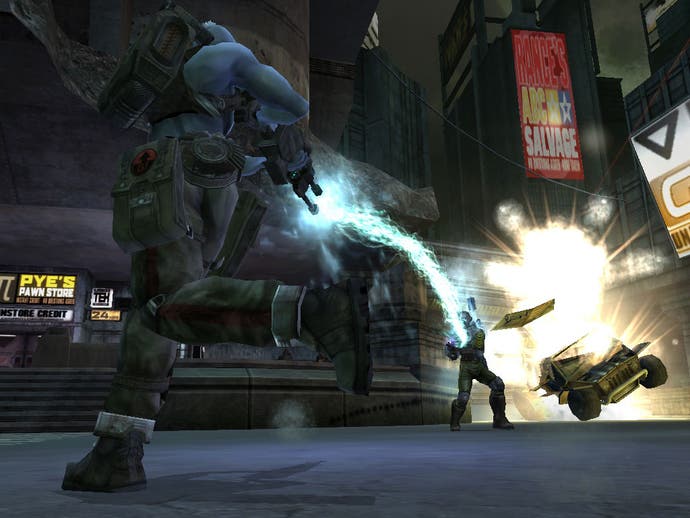
On the one hand, it's refreshing to see that the goal in buying out 2000AD was to keep it in print as a comic, not just to grab ownership of a bunch of potential game franchises. On the other, there's a part of me that still wants to know where my open-world Strontium Dog role-playing game is, or why there hasn't been a Chopper sky-surfing game set amidst the towering spires of Mega City One. How, when even a witless superhero pastiche like Deadpool is getting his own game, can't I play as the A.B.C Warriors?
Aah, the eternal whine of the entitled fanboy. Such is the lifelong passion that 2000AD instils in people. That's why it was a genuine pleasure to fire up Rogue Trooper six years on. It's not a great game, and it's not massively ambitious, but it is a perfect example of the sort of game we're seeing less of as the industry's middle tier gets squeezed out of existence; a solid, unpretentious action game with thoughtfully executed features, all in faithful service of a beloved character. That Rogue's companions from the pages of the Galaxy's Greatest Comic may never get the same treatment is enough to make anyone feel blue.
